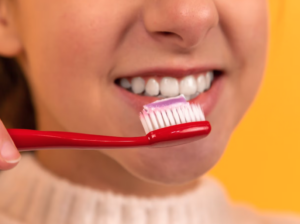It’s not uncommon for your gums to bleed a little when you brush or floss your teeth. This mostly happens when you have not flossed in a while and you carefully floss between all your teeth. Although it is somewhat common to see your gums bleed, you should monitor how much they are bleeding and tell your dentist if it is concerning you.
That being said, it’s important to see your dentist if your gums are bleeding frequently or excessively, as this could be a sign of a more serious problem. If you have any other symptoms of periodontal disease, such as red, swollen, or tender gums; receding gums; bad breath; or loose teeth, be sure to see your dentist right away.
Treating periodontal disease early is important to prevent it from becoming more severe, which can lead to tooth loss. If you have any concerns about your gum health, be sure to talk to your dentist.
Is It Normal For Your Gums To Bleed When Flossing and Brushing?
It is somewhat normal to see your gums bleed a little bit when you floss your teeth for the first time in a while. This doesn’t mean that you should not pay attention to the fact that your gums are bleeding.
Although it is not harmful in many cases to see a few drops of blood when you are flossing, this is a tell tale sign that you aren’t flossing enough. Once you start flossing on a regular basis, your gums will not bleed when you floss or brush.
What Causes Bleeding Gums?
There are a number of reasons why your gums may bleed, but the most common cause is gum disease. Gum disease is an infection of the gums that can damage the soft tissue and bone supporting your teeth. If left untreated, gum disease can lead to tooth loss.
Other causes of bleeding gums include:
- Hormonal changes (such as during puberty, pregnancy, or menopause)
- Certain medications (such as blood thinners or oral contraceptives)
- Vitamin C deficiency
- Brushing too hard
- Trauma to the gums (from rough flossing or brushing)
If you are concerned about your gum health, be sure to talk to your dentist. They will be able to determine the cause of your bleeding gums and recommend the best course of treatment.
When Should You Be Concerned About Your Gums Bleeding?
You should be concerned if your gums are bleeding excessively and if there is a lot of pain when you floss between your teeth. If you have any other symptoms of periodontal disease, such as red, swollen, or tender gums; receding gums; bad breath; or loose teeth, you should see your dentist right away.
Treating periodontal disease early is important to prevent it from becoming more severe and causing tooth loss. If you have any concerns about your gum health, be sure to talk to your dentist.
How to Make Your Gums Stop Bleeding?
The treatment for bleeding gums will depend on the underlying cause. If your gums are bleeding because of gum disease, your dentist may recommend a deep cleaning (also called scaling and root planing) to remove the plaque and tartar buildup beneath your gum line. In more severe cases, surgery may be necessary to restore the health of your gums.
If your gums are bleeding for another reason, such as hormonal changes or certain medications, your dentist will work with you to determine the best course of treatment.
Bleeding gums can be a sign of a more serious problem, so it’s important to see your dentist if your gums are bleeding frequently or excessively. If you have any other symptoms of periodontal disease, such as red, swollen, or tender gums; receding gums; bad breath; or loose teeth, be sure to see your dentist right away.
What are the symptoms of Gum Disease?
If you have experienced excessive gum bleeding, it is important to look for other signs of gum disease. The symptoms of gum disease include:
- Bleeding gums
- Red, swollen, or tender gums
- Receding gums
- Bad breath
- Loose teeth
If you have any of these symptoms, be sure to see your dentist right away. Gum disease is a serious condition that can lead to tooth loss if it is not treated early. If you do not have any of these other symptoms, it is most likely that you just haven’t flossed in a while and your gums aren’t used to the flossing.
Treating periodontal disease early is important to prevent it from becoming more severe, which can lead to tooth loss. If you have any concerns about your gum health, be sure to talk to your dentist.
Contact Lane And Associates Today!
If you are experiencing bleeding gums and you think that your gums are bleeding more than what they should, get in contact with a dentist if you do not already have a regular practice you visit. Lane and Associates Family Dentistry has multiple locations throughout North Carolina and can help you with all of your dental needs. We offer a variety of services, such as teeth cleanings, dental implants, and more. Schedule an appointment with us today!





